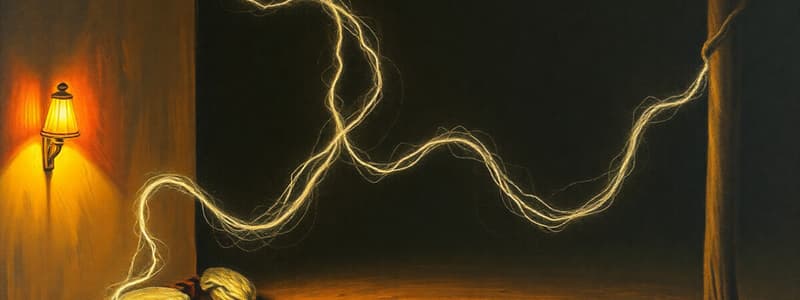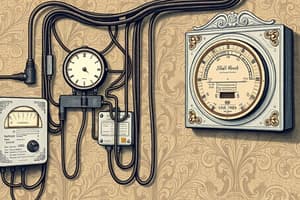Podcast
Questions and Answers
What type of current is typically supplied to our homes?
What type of current is typically supplied to our homes?
- Static Current
- Alternating Current (A.C.) (correct)
- Residual Current
- Direct Current (D.C.)
Electrical energy is only measured in joules (J).
Electrical energy is only measured in joules (J).
False (B)
What is the primary purpose of the earth (ground) wire?
What is the primary purpose of the earth (ground) wire?
To provide safety by preventing electric shocks.
One kilowatt-hour represents the energy consumption of a device with a power rating of _____ when it operates for one hour.
One kilowatt-hour represents the energy consumption of a device with a power rating of _____ when it operates for one hour.
Which of the following is NOT a source of electricity?
Which of the following is NOT a source of electricity?
Match the wire types with their functions:
Match the wire types with their functions:
The commercial unit of electrical energy is referred to as the megawatt-hour (MWh).
The commercial unit of electrical energy is referred to as the megawatt-hour (MWh).
What happens to the magnitude and polarity of alternating current (A.C.) over time?
What happens to the magnitude and polarity of alternating current (A.C.) over time?
Which device is used to measure the amount of electrical energy consumed?
Which device is used to measure the amount of electrical energy consumed?
A parallel circuit allows devices to operate independently of each other.
A parallel circuit allows devices to operate independently of each other.
What is the formula to calculate energy consumed in kilowatt-hours?
What is the formula to calculate energy consumed in kilowatt-hours?
A safety device that protects against excessive current flow is called a _____.
A safety device that protects against excessive current flow is called a _____.
Match the following electrical devices with their functions:
Match the following electrical devices with their functions:
What characteristic is true about an electric fuse?
What characteristic is true about an electric fuse?
Poor insulation of wires is a contributing factor to electric shock.
Poor insulation of wires is a contributing factor to electric shock.
Name one precaution that should be taken to ensure electrical safety.
Name one precaution that should be taken to ensure electrical safety.
Which statement is true regarding static electricity?
Which statement is true regarding static electricity?
Like charges attract each other.
Like charges attract each other.
What are the two types of electric charges?
What are the two types of electric charges?
Insulators restrict the movement of electric charge due to very few free ______.
Insulators restrict the movement of electric charge due to very few free ______.
Match the following methods of charging with their descriptions:
Match the following methods of charging with their descriptions:
Which of the following is NOT a common insulator?
Which of the following is NOT a common insulator?
An electroscope is used to detect the magnitude of electric current.
An electroscope is used to detect the magnitude of electric current.
Explain how a conductor is charged by conduction.
Explain how a conductor is charged by conduction.
What is the main function of a lightning conductor?
What is the main function of a lightning conductor?
Gold leaves in an electroscope will repel each other when they have opposite charges.
Gold leaves in an electroscope will repel each other when they have opposite charges.
What should you do if you are caught outside during a thunderstorm?
What should you do if you are caught outside during a thunderstorm?
When lightning strikes a building, it can cause fires, __________, or electrical failures.
When lightning strikes a building, it can cause fires, __________, or electrical failures.
Match the following safety measures with their descriptions:
Match the following safety measures with their descriptions:
Flashcards
Electrical Energy
Electrical Energy
The electrical energy carried by the current from the power source to an appliance.
Electrical Power
Electrical Power
The rate at which electrical energy is consumed by a device, calculated by multiplying voltage, current, and time.
Direct Current (DC)
Direct Current (DC)
The type of electrical current where the direction and magnitude of flow remain constant.
Alternating Current (AC)
Alternating Current (AC)
Signup and view all the flashcards
Live Wire
Live Wire
Signup and view all the flashcards
Neutral Wire
Neutral Wire
Signup and view all the flashcards
Earth Wire
Earth Wire
Signup and view all the flashcards
Kilowatt-hour (kWh)
Kilowatt-hour (kWh)
Signup and view all the flashcards
Energy Consumption
Energy Consumption
Signup and view all the flashcards
Electric Meter
Electric Meter
Signup and view all the flashcards
Electric Fuse
Electric Fuse
Signup and view all the flashcards
Miniature Circuit Breaker (MCB)
Miniature Circuit Breaker (MCB)
Signup and view all the flashcards
Series Circuit
Series Circuit
Signup and view all the flashcards
Parallel Circuit
Parallel Circuit
Signup and view all the flashcards
Short Circuit
Short Circuit
Signup and view all the flashcards
Electric Shock
Electric Shock
Signup and view all the flashcards
What is an electroscope?
What is an electroscope?
Signup and view all the flashcards
What is Lightning?
What is Lightning?
Signup and view all the flashcards
What is a Lightning Conductor?
What is a Lightning Conductor?
Signup and view all the flashcards
How does an electroscope work?
How does an electroscope work?
Signup and view all the flashcards
What safety measures should you take during a lightning storm?
What safety measures should you take during a lightning storm?
Signup and view all the flashcards
Static Electricity
Static Electricity
Signup and view all the flashcards
Conductors
Conductors
Signup and view all the flashcards
Insulators
Insulators
Signup and view all the flashcards
Charging by Conduction
Charging by Conduction
Signup and view all the flashcards
Charging by Induction
Charging by Induction
Signup and view all the flashcards
Electroscope
Electroscope
Signup and view all the flashcards
Gold Leaf Electroscope
Gold Leaf Electroscope
Signup and view all the flashcards
Like Charges Repel, Unlike Charges Attract
Like Charges Repel, Unlike Charges Attract
Signup and view all the flashcards
Study Notes
Electricity
- Household electricity powers various home appliances like lighting, heating, cooling, and cooking. It's delivered as alternating current (AC) through a distribution network.
Types of Current
- Direct Current (DC): Current remains constant over time. Examples include cells and batteries.
- Alternating Current (AC): Current changes in magnitude and polarity over time. Examples include mains electricity and electric generators.
Sources of Electricity
- The electric cell/battery
- The mains (electricity from local electricity board)
- Generators (or dynamos)
- Solar cells
Electrical Energy and Power
- Electrical energy is transferred by electric current from a power source to a device.
- Energy consumption depends on voltage, current, and time. It's measured in joules (J) or kilowatt-hours (kWh).
Colour Coding of Wires
- Live (or Phase) Wire: Carries current from the power source to the appliance (typically red or brown).
- Neutral Wire: Completes the circuit, carrying current back to the power source (usually black or blue).
- Earth (or Ground) Wire: Provides safety by connecting the appliance to the ground, preventing electric shocks (green or yellow-green striped).
Commercial Unit of Electrical Energy
- The kilowatt-hour (kWh) is the commercial unit used to measure energy for billing.
Electric Meter
- An electric meter measures the electrical energy used by a household or business.
- Analog and digital meters are the two main types.
Electric Fuse (Safety Device)
- A fuse is a safety device to prevent excessive current flow, which can overheat and cause fires.
- It's a thin wire with a low melting point connected in series in an electrical circuit.
- Fuse wire thickness depends on its current rating.
Miniature Circuit Breaker (MCB)
- An MCB is an automatic electrical switch to protect electrical circuits from overloads and short circuits.
Household Electrical Circuits
- These are networks of wires, switches, outlets, and appliances delivering electricity.
- Series Circuits: Components connected one after another; if one fails, the entire circuit stops.
- Parallel Circuits: Components are alongside each other; if one fails, other components operate independently.
Hazards of Electricity
- House circuits overloaded may cause short circuits.
- Poor insulation may cause short circuits or excess current flow.
- Electric shock occurs when touching live wires.
Precautions
- Do not touch switches with wet hands.
- Ensure connections to plugs, sockets, and switches are securely joined.
- Appliances should be earthed correctly.
- Do not repair appliances while in use.
Static Electricity
- Static electricity is the buildup of electric charge on objects.
- It's different from current electricity, which involves the flow of charge.
- Objects can be charged by rubbing.
- Like charges repel, unlike charges attract.
Conservation of Charge
- Before rubbing, both objects are uncharged.
- On rubbing, both objects get equal and opposite charges.
Conductors and Insulators
- Conductors: Materials that allow electric current to flow easily (e.g., metals).
- Insulators: Materials that do not allow electric current to flow easily (e.g., rubber, glass, wood).
Methods of Charging a Conductor
- Charging a conductor involves creating an imbalance of electric charge, either by conduction or induction.
Charging by Conduction
- A charged object contacts a neutral conductor making the conductor charged.
Charging by Induction
- Transferring electrical energy/charge without direct contact.
Electroscope
- An electroscope is a device used to detect and measure electric charge, particularly to determine the charge's polarity.
- Gold leaf electroscopes provide a visible indication of the charge's presence and magnitude.
Lightning
- Lightning is a sudden electrostatic discharge during thunderstorms.
- Safety measures include avoiding standing under trees or tall buildings, sitting inside a car, and avoiding carrying umbrellas or using wired phones during storms.
- A lightning conductor is a device used to protect buildings from being damaged. It provides a direct path for electrical charges to travel safely to the ground.
Studying That Suits You
Use AI to generate personalized quizzes and flashcards to suit your learning preferences.




